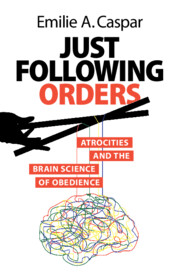
- Cited by 4
-
Cited byCrossref Citations
This Book has been cited by the following publications. This list is generated based on data provided by Crossref.
Tricoche, L. Rovai, A. and Caspar, Emilie 2024. When the brain says “No!”: An MRI study on the neural correlates of resistance to immoral orders. Imaging Neuroscience, Vol. 2, Issue. ,
Caspar, Emilie A. and Pech, Guillaume P. 2024. Obedience to authority reduces cognitive conflict before an action. Social Neuroscience, Vol. 19, Issue. 2, p. 94.
Caspar, Emilie A Rovai, Antonin Lo Bue, Salvatore and Cleeremans, Axel 2025. Neural correlates of the sense of agency in free and coerced moral decision-making among civilians and military personnel. Cerebral Cortex, Vol. 35, Issue. 3,
Gächter, Simon Molleman, Lucas and Nosenzo, Daniele 2025. Why people follow rules. Nature Human Behaviour, Vol. 9, Issue. 7, p. 1342.
- Publisher:
- Cambridge University Press
- Online publication date:
- July 2024
- Print publication year:
- 2024
- Online ISBN:
- 9781009385428
- Subjects:
- Social Psychology, Biological Psychology, Psychology

